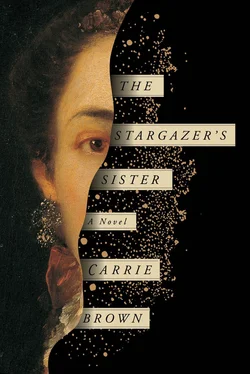—
NOW, ON THIS COLD MORNING in the kitchen, Lina kneels on the chair, holding the spoon before her eyes as William has shown her. The light captured in the water’s swaying surface sways a little, too.
Then, strangely — the swaying increases. She tries to hold the spoon steady, but it is her hand that is trembling, she realizes, and the arm attached to the hand. No, it is her whole body, and the chair on which she kneels!
A scattered mound of dry peas on the table jumps and dances as if dropped from an opened fist poised a half inch above the table’s surface. In her mother’s cup with the delicate blue rim, the tea shivers like the surface of the river when the wind blows. On the far wall, the tin plates on the dry sink begin to clatter.
Lina looks up in alarm.
There can be no explanation but this: the unseen particles of the world, the animalcules and atoms, are in revolt!
Drops from her spoon fall onto the table.
She rears back, expecting that from these drops hundreds of animalcules will spring forth, waving centipede legs and wagging their bumblebee heads.
The world as she knows it is about to fly apart, the secret life of all things revealed!
But nothing happens, except that the terrifying trembling intensifies. In the fireplace beside which her mother has bent to tend the kettle, the logs collapse suddenly as if by dark instruction. Sparks roar up the chimney, and a tide of embers erupts onto the hearth by her mother’s feet with a dry sound like pebbles shifting. Lina sees her mother jump away from the red coals, groping for the mantel with one hand to steady herself, flattening a palm over her big belly.
She turns toward Lina. From her expression, Lina knows what her mother is thinking: Lina is somehow at fault.
But Lina is all the way across the room, terrified and wide-eyed on her chair.
She grips the table’s edge. The rumbling runs from her fingers and up her arms and into her head and teeth. The peas scatter and fall to the floor. With her eyes she follows the teacup as it totters across the tabletop, a precarious half inch to go before it falls and shatters. She knows she should save the cup, but the chair rocks beneath her, and she cannot release her fingers from the table’s edge. From the next room comes a violent musical chaos as the instruments tumble from their places against the wall: the violins, flutes, guitar, the little harp. A moment later the cup tilts over the table’s edge and shatters with a sound like ice breaking.
From above them comes the crash of something heavy — a wardrobe falling? Pots sway from their iron hooks in the beams across the kitchen ceiling.
Lina cries out and puts her arms over her head.
But then, a moment later, the movement dies away. The peas roll to a stop. There is no further parliament of voices from the cups or the fire or the pots or the plates or the harp. Instead, in the fireplace and on the hearth, the thick carpet of fat red embers rustles quietly as if to say, nothing here, nothing here, nothing here. Harmless little new flames begin to raise their blue and white and gold hoods among the disarranged logs.
Lina looks out the window. Through the rippled glass she sees that the iron lid of the November sky remains locked in place. She can’t see the moon, though. Perhaps it has been shaken loose from the sky, its collision with the earth the cause of the terrible shaking.
Except for the noise of the fire, there is silence in the room — silence everywhere, she realizes.
There is a taste of sick in her mouth.
Her mother has fallen to her knees on the floor, forehead and palms touching the bricks.
Lina scrambles to stand up on her chair. It seems somehow safer up there.
She suffers from what her father calls excesses of feeling, the Überangst. He, too, is a fellow sufferer, he confides. Their nerves are too sensitive for this world and its rough treatment. They often have pains in their stomachs.
Now she claps her hands. She wants the world restored, and she wants to shatter the frightening quiet.
“Mama,” she says. “Mama!”
Lina understands that when her father says she is a person of passionate feeling, he means it fondly, even admiringly. He is sympathetic. They are united in this weakness that is also somehow a sign of their refinement in the family. But when her brothers are wild, they are simply shooed outside, while if Lina so much as jumps from bench to floor in high spirits, her mother comes after her with a furious face and catches her by the apron strings, wrenching them hard to make her sit down. A girl is not supposed to demonstrate her feelings as a boy can.
When she is scolded, Lina runs outside and hides in the stable. She lies on the horse’s back, her face in his mane. Against her cheek she feels the vibrations of his big teeth grinding as he tears at the hay in his stall. Her mind goes into a buzzing state in which she thinks of not her mother, not her mother, not her mother. Nothing.
Now she stands on the chair in the silent house. Her mother remains kneeling, forehead to the floor, her palms flat against the brick.
“Mama!” Lina says again. She claps her hands. Mama, Mama, Mama!
Slowly her mother rises, turns a stone face toward Lina.
Lina stops clapping. She sees what is coming, but she cannot prevent it.
In two strides her mother crosses the room and slaps her. Then she collapses on a chair, one hand on her belly, the other across her mouth, eyes closed, moaning.
Lina slips to the floor, her own gaze averted, her cheek burning. On her knees, she collects the scattered peas one by one. Then she crawls under the table and sits there cross-legged, the peas in her lap. These incidents when her mother strikes her fill Lina with anger — she wants to hit back, to claw and scratch, but knows she must not — and also a strange embarrassment and sadness. She does not look at her mother now.
Then voices are raised in the street. From under the table Lina watches her mother wipe her face and gather her bulk and cross the room to the door that leads to the courtyard, opening it a crack. Between her mother’s feet, Lina sees the bantams outside rush the doorway and set up a clamor that joins the clamor of human voices. Cold air, bright and sharp with the smell of smoke, slides across the floor. Her mother’s skirt disappears. Lina hears her quick footsteps cross the courtyard.
In the fireplace, the flames chuckle and murmur. The room is smoky, Lina realizes. Her eyes tear.
When the church bells begin to ring, bells in steeples all across Hanover, it seems, Lina does not know if the sound is one of celebration or warning. All the bells’ voices raised together at once make a mighty noise. We are here, we are here! But alone under the table, she feels far away from whatever is taking place in the streets, joyful dancing or preparations to flee. Will someone remember to come get her, if everyone decides to leave? Will William run home from the parade grounds and find her here?
She thinks about the animalcules and atoms. Surely the shaking was the cause — or the result? — of their restlessness. The animalcules are everywhere, trapped in everything. She thinks of what would be left behind — only the empty skins of things? — if the animalcules finally broke their bonds and escaped. She imagines all the objects of the world collapsed, limp as discarded stockings.
William says that through careful investigation every natural mechanism in the world may be understood. On his example, Lina pokes the horse’s fresh manure with a stick, observes the trapped steam rise into the cold air. She lies in the hayloft and watches the yellow dog give birth to a litter of pups, each in its wet blue sack. She fogs the window to see the damp flower of her breath bloom and contract against the glass.
Читать дальше












